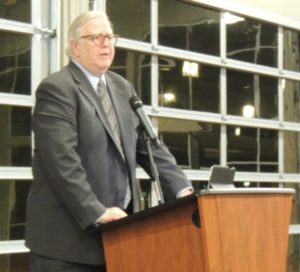
In an age where everyone can be a journalist, Gene Policinski, a founding editor of USA Today and chief operating officer of the Newseum Institute and its First Amendment Center, predicted that use new technologies will make reporters’ credibility a more valuable commodity.
Policinski was the keynote speaker for the Best of the South Awards Banquet, held in the Wilma Rudolph Event Center during SEJC’s 30th annual convention in Clarksville, Tennessee, on Friday, Feb. 19.
He called the modern cell phone both a toy and a necessity in today’s media world.
“You and I, I suspect, see our lives through this prism, through this device,” Policinski said, holding his cell phone. “And that, to me, is where we’re going to have to be in the 21st century, despite all of the talk about the future of the free press — the viability of journalism in a world where everybody is a journalist. And when everybody is a journalist, whom do I trust?
“But when you move across that spectrum of a toy to a tool to a necessity, the value of the information that I receive goes up exponentially in terms of, is it reliable and is it credible?” said Policinski.
With information so easily available, he noted, people have begun to say newspapers are dying and are not concerned about the credibility of the information they receive. Explaining what he calls the “Kardashian effect,” Policinski said every time journalists publish a click-bait or eye-candy story meant only to entertain and draw in readers, “we do ourselves a disservice, we do our profession a disservice, and we do the future of the free press a disservice because we say to people, ‘Look how trivial we can be.’”
However, he added optimistically, consumers will still turn to good journalism because they will still ask themselves where can they find the information they trust and where can they find the people who really know what’s happening.
Even with op-ed columns, he said, he has found people look for opinions that challenge them.
“Ultimately, the value in journalism has always been to give people the news and information they need to make decisions about their lives,” Policinski told the audience of more than 300 faculty and students. “The need and want of people to make informed decisions is the key to defending a free press.”
He stressed the importance of quality journalism, and the positive impact a story can have on thousands of lives, citing a story about two local journalists who recognized a regional trend in infant deaths in hospitals.
“You tell me journalism isn’t important when it does that story,” he challenged the crowd. “You tell me that it’s biased media or irrelevant media. We saved 16,000 lives with one series of stories. I think that’s the tremendous power of credible, accurate, meaningful, relevant, serious and maybe even boring information.”
He also stressed the importance of the media to be able to get interviews, get information and provide discussion for the masses.
“We’re all participants in this incredible moment in human history where, for the first time, we can talk to the rest of the planet and it can talk back,” he said.
Policinski is a co-author of the weekly, national column, “Inside the First Amendment,” and is host of the online news program “Journalism/Works.” He is an adjunct faculty member at Winthrop University in Rock Hill, South Carolina, as well as a certified journalism educator from Journalism Education Association.
“It’s up to you, and for me as long as I’m still active, to stay the course in terms of bringing information, of bringing news to the best of our ability, the most accurate, fair representative way that we possibly can because that is what people will come to value.”
